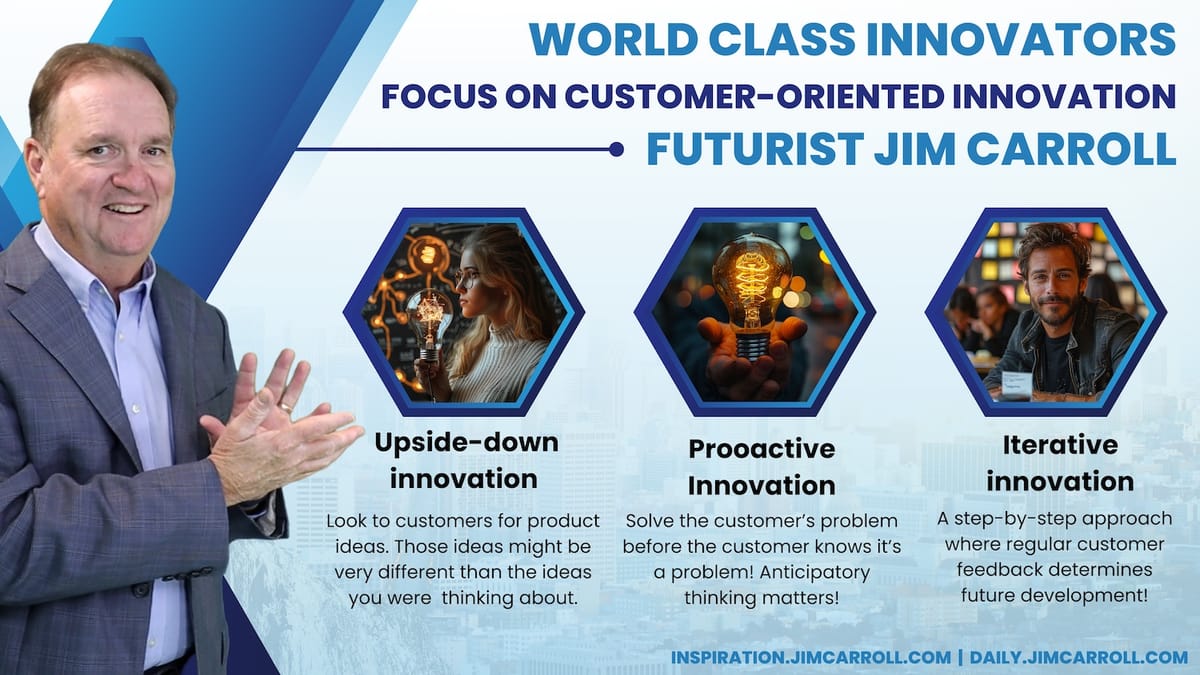"World class innovators focus on customer-oriented innovation" - Futurist Jim Carroll
Futurist Jim Carroll is running his Daily Inspiration series for the weeks of March 11/18 on the theme of "What is it that World Class Innovators Do That Others Don't Do?" The leadership ideas are based on an original keynote he gave early in 2009 after a client asked him to identify these issues. He developed this carefully curated list based on 15 years of observations of how his global clients responded to fast-paced change. The concept worked its way into a 2010 video project that he undertook for Deloitte - and these posts will share relevant content from that video project when applicable.
When I started compiling my list of 'world-class innovation,' I knew that I had to include the fact that I was seeing a significant shift in the source of innovation within many of my global clients.
What was the shift? Rather than pursuing an innovation pathway in which their internal R&D or leadership teams were always the origin of most new product and service development ideas, there was an increasing focus outward. There was a realization that the key source for innovation ideas would come from customers - what is now routinely called 'customer-oriented innovation.' It seems like an obvious thing to do, but to this day, there are many organizations that don't enshrine this as a core value in their innovation culture and methodology - which is a real missed opportunity.
In my view, three fundamental trends were underway with 'world-class innovators' that would forever shake up the world of ideas and invention:
- Upside-down innovation: That's looking to customers for product ideas. Those ideas might be very different than the ideas you were thinking about.
- Proactive Innovation: Solving the customer's problem before the customer knows it's a problem! Anticipatory thinking matters!
- Iterative innovation: A step-by-step approach where regular customer feedback regularly determines future development!
The importance of this shift can't be understated; I previously wrote about it this way:
When thinking about new product or service development, don’t do it in isolation. Seek advice and guidance from your customers and business partners —or, even let them drive the innovation agenda.Turn your creativity and imagination engine upside down! Make your R&D strategy less about what you see as opportunities – and more about what your partners and customer see.. Adopt the mindset that ‘customer-oriented and partner-based innovation’ will be a key strategy – and you might find that solution to challenges come faster!
Upside-down innovation? I coined the phrase when Disney had me in for a leadership meeting - a pretty surreal moment when one of the world's most creative companies invited me in for my thoughts and insight on the concept of creativity! What I observed with this client was a leadership team that was busy trying to get its entire corporate culture to look to customers as the source of innovation, rather than trying to do it all internally.
What were the key leadership lessons that came from Disney? The problem was particularly acute within the 'consumer products division' - i.e. the group that develops Disney-themed toys and other products. They had traditionally been responsible for an innovation plan that went like this:
- Get the assortment right, i.e. in terms of new product
- Figure out the merchandising plan
- Then do the marketing
They then realized that the choices consumers were making were evolving so fast that they no longer had a truly good grasp on the innovation agenda that they should be pursuing; the model above was not working! They also came to realize they while they were busy defining the product they might take to their retailers — those very same retailers saw entirely different product and market opportunities. So what did they do? They turned things around — and learned how to work with the retailers, by having the retailers do much of the product innovation! Or, in other words – customer-oriented innovation.
Proactive innovation? Anticipatory thinking - figure out what types of problems the customer might soon be facing in a new and complex world, and make sure your product or service solves that problem - so by the time the customer has a problem you are ready to swoop in with a solution! You'll look brilliant - and accelerate customer love and loyalty. Don't chase solutions. Solve problems. Their problems. This type of thinking involves developing a deep and idea-nurturing relationship with the customer, constantly working with them to understand their frustrations, challenges, and new opportunities with your product. This often becomes a springboard for a flood of new ideas and opportunities!
Iterative innovation? This was driven by the rapid emergence of 3D printing and other new manufacturing methodologies. A lot of the opportunity from 3D printing comes from the ability for rapid prototyping and design. It unshackles organizations from having to commit to a full production run upon finalizing a product design; instead, it leads to an iterative process in which the product design can be continually changed. A first run of the product is sent out to customers, who will then provide feedback on the product and design. The product is modified based on that feedback; version 2 is released! The iterative process then continues for a time, with the product being regularly redesigned and reinvented - an entirely iterative process of product development!
Customer-oriented innovation? I spoke about this in depth when Burger King invited me to talk at their annual franchise conference in Las Vegas. This was shortly after my work with Disney, where I first broached the idea of flipping things around.
The key lesson with all of this? World-class innovators look outward for ideas and inspiration.
So should you!
Futurist Jim Carroll has been sharing his list of "What is it that World Class Innovators Do That Others Don't Do" with global clients for fifteen years. The insight continues to be powerfully relevant to this day.

